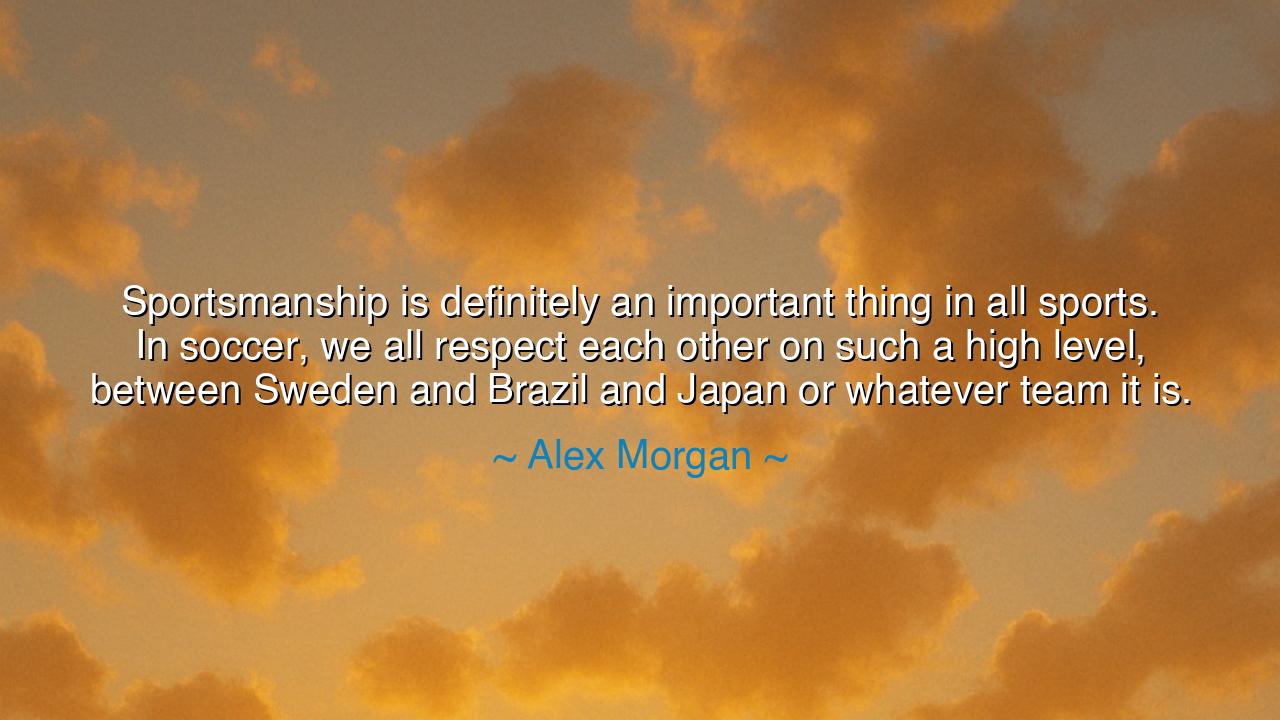
Sportsmanship is definitely an important thing in all sports. In
Sportsmanship is definitely an important thing in all sports. In soccer, we all respect each other on such a high level, between Sweden and Brazil and Japan or whatever team it is.






Hearken, O children of courage and seekers of honor, to the words of Alex Morgan, who proclaimed: "Sportsmanship is definitely an important thing in all sports. In soccer, we all respect each other on such a high level, between Sweden and Brazil and Japan or whatever team it is." In these words lies a timeless truth: that even amidst the clash of strength, speed, and strategy, there endures a sacred principle of respect, honor, and fair play. Sportsmanship is not merely etiquette; it is the very soul of competition, the invisible thread that binds rivals into a fellowship of shared endeavor.
From the earliest games of men and women, in the arenas of Greece and the fields of Rome, victory was never the sole measure of greatness. The ancients understood that the true test of character was not in the score, but in the dignity with which one contended. Alex Morgan’s insight reflects this enduring wisdom: that respect for the opponent, for their skill and perseverance, elevates the contest beyond mere rivalry and transforms it into a celebration of human excellence.
Consider the tale of the 1986 FIFA World Cup, when Diego Maradona, a genius of the game, faced teams with fierce talent and relentless determination. Though Maradona’s brilliance often stole the headlines, he was ever aware that each opponent represented the highest effort of their nation. The mutual acknowledgment of skill, even in the heat of fierce competition, exemplifies the very essence of sportsmanship, the respect that Morgan speaks of—recognizing that glory is shared in the spirit of fair and noble play.
Morgan’s reflection also reminds us that sportsmanship transcends borders and cultures. Whether facing Sweden, Brazil, Japan, or any team, the language of respect is universal. The applause for a well-taken goal, the handshake at the end of a match, the nod to an opponent’s skill—these gestures echo the ancient rites of honor, where warriors, though adversaries in battle, recognized the courage and prowess of each other. Such conduct ensures that the pursuit of victory does not corrupt the heart, but rather refines it.
In modern times, sports are a mirror of society itself. The values of fairness, integrity, and mutual respect demonstrated on the field can inspire nations, youth, and communities. The story of the 1999 Women’s World Cup final, in which the United States faced China, illustrates this: fierce competition, yet mutual recognition, respect, and the celebration of effort above all else. Sportsmanship did not diminish the intensity of the contest; it gave it meaning beyond the scoreboard.
The lesson is luminous: true greatness in any field—whether sports, commerce, or scholarship—is inseparable from respect for others. Skill, talent, and determination reach their highest potential only when tempered by fairness, humility, and acknowledgment of those who strive alongside us. Alex Morgan teaches that it is in this balance of ambition and respect that the human spirit shines most brightly.
Practical action flows naturally from this wisdom: honor your rivals, celebrate their achievements, and compete with integrity. Shake hands after a contest, praise a worthy effort, and recognize that every opponent contributes to your growth. In doing so, you cultivate not only skill, but character, ensuring that your victories are noble and your defeats instructive.
O seeker of excellence, remember this: sportsmanship is the soul of competition, the eternal bond linking rival hearts across fields, nations, and generations. Let Alex Morgan’s words echo in your life, guiding you to pursue greatness not at the expense of respect, but in harmony with it. In this way, the games we play, and the contests we face in life, become not merely trials of strength, but tributes to the enduring power of honor, dignity, and mutual respect.
I can also create a narrative version optimized for oral storytelling, with rhythmic emphasis, rises, and pauses to make it feel like an ancient teaching delivered aloud. Do you want me to do that?






AAdministratorAdministrator
Welcome, honored guests. Please leave a comment, we will respond soon